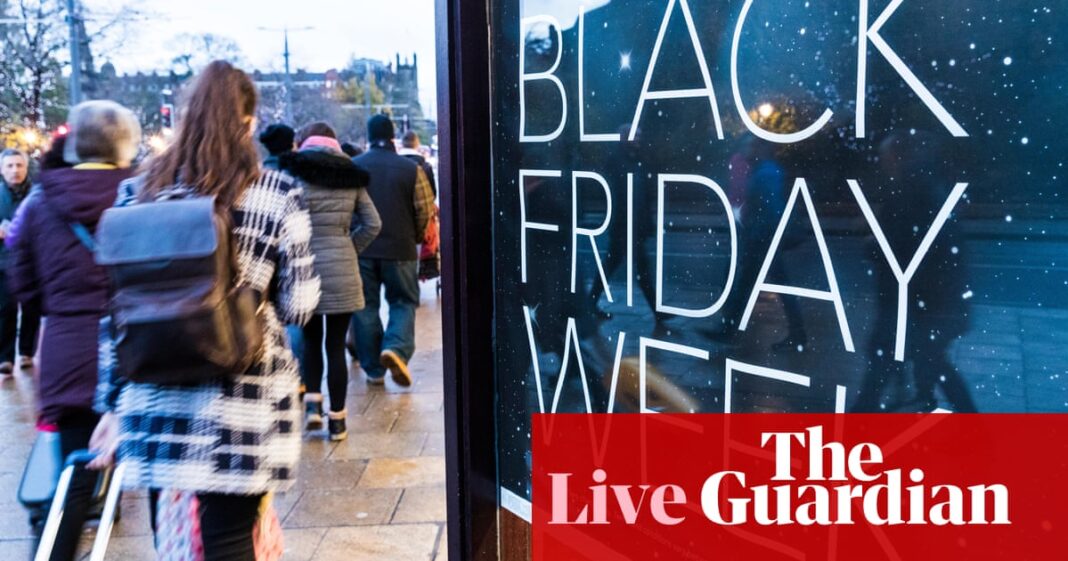Key events
The UK economy is projected to grow by 0.3% in the first quarter of this year, after flatlining in the final three months of 2024, according to a think tank.
The National Institute of Economic and Social Research estimates that the services and production sectors stagnated between October and December while construction posted a slight decline.
Hailey Low, NIESR associate economist, said:
The subdued growth figures today elevate concerns over the UK’s economic outlook moving into 2025. The continued slowdown into Q4 may indicate falling confidence in the short term. However, it is crucial to wait until the additional government spending announced in the budget comes into effect in April before drawing conclusions about economic growth in the medium term.
Two-year gilt yield falls to lowest since 3 January
The yield, effectively the interest rate, on the two-year UK government bond has fallen to the lowest since 3 January at 4.402%, down 6 basis points on the day.
The two-year gilt reflects interest rate expectations.
With UK inflationary pressures reducing and data today showing the UK economy eked out just 0.1% growth in November, expectations of an interest rate cut from the Bank of England next month are rising.
BP cutting 4,700 jobs

Graeme Wearden
BP announced on Thursday that it will cut around 4,700 staff, or over 5% of its total workforce, as part of CEO Murray Auchincloss’ efforts to reduce costs.
BP told staff that 3,000 contractor positions will also be cut, according to a statement to Reuters.
The cuts were announced in an internal memo seen by Reuters earlier on Thursday.

Graeme Wearden
Shares in luxury goods makers are rallying today, after strong results from Switzerland’s Richemont.
Richemont, which owns the Cartier and Van Cleef & Arpels brands and Swiss watch brands Piaget, IWC and Jaeger-LeCoultre, reported a 10% jump in year-on-year sales in the last quarter of 2024, beating forecasts for a 1% rise.
Shares in Richemont have jumped almost 18% today.
Rivals Kering and LVMH Moet Hennessy Louis Vuitton both rose by 9%, as did Burberry.

Graeme Wearden
UK banks are predicting that demand for mortgages will slow in the first quarter of this year.
The Bank of England’s latest Credit Conditions report, released this morning, shows that lenders expect demand for secured lending for house purchases, and for remortgaging, to decrease in the January-March quarter.
That would follow increases in October-December.
Simon Gammon, managing partner at Knight Frank Finance, says:
“Clearly, the lenders think that the beginning of 2025 will be another period of sluggish activity in the housing market. As things stand, this is likely to prove true. On Wednesday afternoon, two large lenders said they would increase the cost of some mortgage products – the first of the major lenders to do so since the latest round of bond market volatility.
“That will probably prompt others to follow, which will be disappointing for anybody seeking to purchase or remortgage a home in the months ahead. That said, fairly positive inflation data from both the UK in and the US this week has calmed bond markets, which suggests we’ll see a swift repricing, rather than weeks of sustained increases in mortgage rates.”
Jonathan Reynolds, the business secretary, said he was worried about a potential tariff war, with Donald Trump returning to the White House next week.
He told Sky News:
It’s going to be a challenging time for anyone who is responsible for trade in a big economy because of some of those pledges that were made in the campaign.
Asked if he was worried about a tariff war, he said:
I am, because the UK is a very globally-orientated economy, so the exposure, the danger to the UK is actually greater than even some comparable countries around that. So, a lot of our work has been preparing for that, engaging early with the new administration.
Ultimately, tariffs are paid for by your own people. So, it’s got real pressures in terms of inflation, in terms of your ability to employ people, to export to other markets.
However, he insisted the UK was “well prepared” and had a “good argument to make” in trade talks with the US, and there is a “chance to get an even better relationship”.
UK mortgage rates have risen slightly, according to Moneyfacts.
The average 2-year fixed mortgage rate today has ticked up to 5.5% from 5.49% yesterday, while the five-year fix is up to 5.29% from 5.27%.
In the bond markets, UK yields have edged up by one basis point, following yesterday’s sharp declines.
The UK’s trade deficit narrowed in November to £4.8bn, from a revised £5bn in October, separate figures from the Office for National Statistics showed.
However, in the three months to November the total trade deficit widened by £3.8bn to £10.8bn.
Elliott Jordan-Doak, senior UK economist at Pantheon Macroeconomics, said:
There will likely be some bumps along the road in the coming months on account of movements in energy and currencies markets—oil has risen sharply in the past week and sterling has depreciated. These moves—Brent crude would rise by 12% between November and January if today’s market price holds until the end of the month—point to rises in goods import prices. What’s more, rising energy costs are likely to lead to a widening of the trade balance in the coming months.
Matt Britzman, senior equity analyst at Hargreaves Lansdown, said:
European markets are waking up with a spring in their step, thanks to cooling US core inflation and upbeat bank earnings fuelling risk-on sentiment. The FTSE 100 is joining the party, up 0.6% in early trading, despite UK GDP data for November that showed growth of a meagre 0.1%. Although this was shy of expectations it still signals some resilience, with services and construction pulling their weight despite a manufacturing slump.
With inflation easing and sluggish economic growth, a 25bps rate cut by the Bank of England in February seems increasingly likely. UK government bond yields have felt an immediate impact, pulling back yesterday from multi-decade highs, offering some relief to risk-on investors and borrowers alike.
Here’s our full story on the UK economy returning to growth in November.
The ONS director of economic statistics, Liz McKeown, said:
The economy continues to be broadly flat, having grown slightly in November following two small falls in the previous months.
She added that services “grew a little”, with wholesaling, pubs and restaurants and IT companies all faring well, partly offset by falls in accountancy and business rental and leasing.
Construction also grew, led by new commercial developments, while production continued to decline in November with further falls across a range of manufacturing industries and oil & gas extraction companies.
Reeves to meet regulators

Kalyeena Makortoff
Rachel Reeves is expected to pile pressure on UK regulators to do more to support growth when she summons bosses to No 11 on Thursday.
The chief executives of watchdogs including the Competition and Markets Authority, communications regulator Ofcom, water regulator Ofwat, and the energy regulator Ofgem, are due to meet the chancellor and business secretary Jonathan Reynolds in Downing Street, as they face accusations that their work has been presenting a barrier to investment.
The Office of Rail and Road, the Environment Agency and the Civil Aviation Authority are also due to appear at the midday meeting.
The meeting comes weeks after Reeves, Reynolds and prime minister Keir Starmer wrote to 17 of the UK’s regulators on Christmas Eve, ordering them to put forward pro-growth proposals. Thursday’s meeting is the first in a series of check-ins with those regulators, as the government reviews their plans and progress.
Ministers and officials across government will be engaging with other regulators, including the Financial Conduct Authority and the Bank of England’s Prudential Regulation Authority, about their proposals in the coming weeks.
But regulators were put on notice back in October, when Starmer used a speech at the government’s investment summit to promise that he would “rip out the bureaucracy that blocks investment” and ensure that every regulator in the UK “takes growth as seriously as this room does.”
Reeves later told City bankers at the Mansion House dinner in November that post-financial crisis regulator had “gone too far” and resulted in “unintended consequences, which we must now address.”
Government borrowing costs dip as stocks continue to rally
The UK bond market has opened, and yields have edged lower, extending yesterday’s sharp declines. This means UK government borrowing costs are falling after last week’s market turmoil, bringing some respite for the chancellor.
European bond yields are also slightly lower.
The FTSE 100 index has opened higher again, rising by 0.6% or 53 points to 8354. European stocks are also trading higher.
Shadow chancellor Mel Stride said UK growth in the first half of last year, before Labour was elected, ranked as the fastest in the G7, and claimed Rachel Reeves was “killing investment and jobs”.
He added:
This is the third month in a row of disappointing growth figures. The chancellor seems content with burying her head in the sand and blaming the previous government, but this is a crisis made in Downing Street. We need an urgent change of course.
Simon Pittaway, senior economist at the Resolution Foundation, said the GDP data was disappointing, raising fears of stagnation, despite a welcome return to growth.
In recent years the UK has been a growth rollercoaster, with a recession in late 2023 followed by a bounce back in early 2024. But its longer-term record is one of economic stagnation, and that is where Britain risks returning to.
The paltry GDP growth late last year reinforces the need for the government’s economic plans to start bearing fruit.
Isaac Stell, investment manager at Wealth Club said:
The UK economy spluttered back to life in November with growth of 0.1%, following two months of negative growth in September and October. The small amount of growth achieved in November will likely take further heat off a chancellor that has been under significant amounts of pressure over the last few weeks.
The latest figures will be welcomed by the government, however small they are, and when coupled with yesterday’s inflation undershoot provide a small glimmer of hope. However, Reeves and co will not want to hang out the bunting just yet as challenges certainly remain in the form of upside surprises to inflation and businesses having to shoulder significant rises in national insurance contributions come April. However, with an economy that is far from firing on all cylinders, and inflation, for the moment moderating, much needed rate cuts from the Bank of England look like a real possibility.


